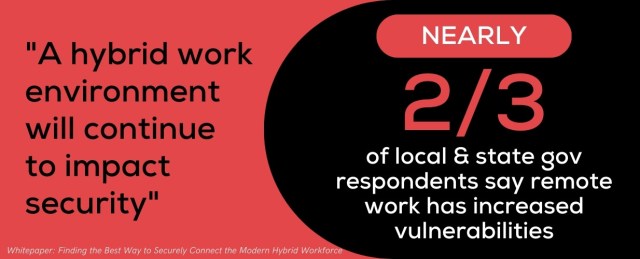
It’s no news that the pandemic response has accelerated IT modernisation in local government in ways never seen before, especially with regard to the modern hybrid workforce.
It’s also significantly added to the stresses affecting councils – some of which were still feeling the shockwaves of amalgamations – with reduced revenues, heightened cyber security concerns and an increasing demand to deliver services digitally.
The challenges are tough, but they don’t have to be insurmountable, as long as councils are smart about leveraging the technology that’s out there and accessing the support to get new systems in place.

That’s where SASE – an acronym for Secure Access Service Edge and pronounced ‘Sassy’ – comes in.
According to Garth Sperring, General Manager – Network, at digital managed services consultancy Nexon, SASE has the potential to help local governments enhance their digital security, protect customer data, improve the customer and employee experience, and ensure scalable and cost-effective security architecture.
Moving on from VPN
For years VPN was the traditional cornerstone for access to business applications, mostly designed for occasional use by a few staff, Sperring says. But the shift to hybrid work changed all that.
“Many local governments are now asking themselves, do we invest more in VPN, which means more equipment and licences, or do we go for a modern cloud-based solution?” he says.
Put simply, SASE – or Secure Access Service Edge – is a relatively new model that combines networking and security into one cloud-based service. It can integrate functions like firewall, malware protection, intrusion controls, secure web gateways, data loss prevention, and zero trust network access.
SASE can help you end the security nightmare of remote working, by providing a seamless hybrid working environment. It circumvents the need for multiple VPN connections, still granting your users access to data and applications. Fully implemented, it can deliver security-as-a-service from the cloud on a per-user basis, while still providing centralised management and control.
The concept has been around since about 2019, but the pandemic cemented the need for SASE, and local government executives are grasping the need to pivot. When a recent survey by Gartner asked state and local government CIOs which technologies are most likely to be implemented by 2025, three quarters (75 per cent) of respondents said SASE. *1
Partnering with a managed service provider
A managed services provider can provide the technology, expertise and processes needed to set up a SASE framework, and many local governments are going down this path. And bonus points, SASE can also qualify as an applicable service under many panel arrangements.
“A managed service provider can help accelerate implementation and provide tailored solutions,” says Sperring, who has worked with councils including Liverpool City Council, Shire of Broome, and Noosa to modernise their security environments.
Since de-amalgamation from the Sunshine Coast in 2014, Noosa Shire Council faced the challenge of building and managing a complete network and communications environment for multiple locations and a mobile workforce.
“The primary objective was to get a telephone system up and running in a very short time,” says Noosa’s ICT Manager corporate services Justin Thomas.
Noosa brought Nexon on board to provide and manage a hosted Unified Communications (UC) platform, a hosted Exchange platform, and a fully managed multi-protocol-label-switching (MPLS) network for all council sites.
The results were immediate and positive, Thomas says. He says staff and customers have noted tangible benefits including flexibility, increased visibility, user satisfaction and time and cost effectiveness.
Since then, Noosa’s also been able to scale up or down to meet resident and community needs.
Putting councils at an advantage
As a local council striving to support your community in the most efficient and effective way, SASE can help by:
- Managing the risks of a hybrid workforce
- Providing deeper insights into your community and increasing the rate of positive resident interactions
- Facilitating shorter call wait times via integrated contact centre processes
- Empowering staff and ensuring speedy service delivery by automated manual tasks
- Maintaining trust via sound cybersecurity systems and protection against loss of data
- Controlling your budget with cost effective, scalable IT architecture
- Enabling you to leverage panel procurement contracts, making for faster deployment
Why go with a managed service provider?
Managed service providers like Nexon offer the end-to-end technology solutions and local government expertise that councils need. In addition, they also provide risk assessments, audits, security strategy development, and training.
Explore Nexon-delivered SASE for your council today.
When considering partnering with a managed services provider it’s crucial to make sure you find consultants that will work closely with your team to deliver fit-for-purpose solutions and are invested in improving performance, service delivery and outcomes for your staff and your community.
Learn more about Nexon’s digital solutions tailored for local government.
*1: Gartner – 2023 CIO Agenda Insights for State and Local Governments
Comment below to have your say on this story.
If you have a news story or tip-off, get in touch at editorial@governmentnews.com.au.
Sign up to the Government News newsletter
Moses Black on: Planning policies and book bans: NSW councils clash with state
Jojo on: Planning policies and book bans: NSW councils clash with state
Frank Wilson on: Tributes flow for ‘Blacktown’s favourite son’